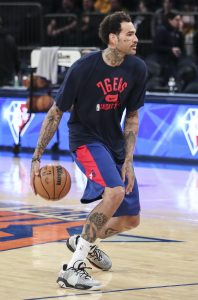It has been nearly a month since the NBA’s trade deadline passed, and the post-deadline transaction wire continues to be pretty busy, with teams that opened up roster spots at or since the deadline still working to fill them.
Clubs are also making plenty of roster moves with their players on two-way contracts, opening up two-way slots by either promoting those players to standard deals or by cutting them to take a flier on another prospect.
It has been a few weeks since we last checked in on which teams have open roster spots, so it’s worth taking a closer look at that today. If a team isn’t listed below, you can assume it has a full 17-man roster made up of 15 players on full-season standard contracts and a pair on two-way deals.
[RELATED: 2022/23 NBA Roster Counts]
Let’s dive in…
Teams with an open 15-man roster spot:
- Boston Celtics
- Charlotte Hornets
- Houston Rockets *
- Los Angeles Lakers
- New York Knicks *
- Utah Jazz ^
* These teams have one open roster spot and one filled by a 10-day contract.
^ This team has two open roster spots and one filled by a 10-day contract.
The Celtics, Hornets, and Lakers have pretty straightforward roster situations — they’re carrying 14 players on standard, rest-of-season contracts, with open spot left to fill. The Celtics and Lakers may be more inclined to fill their openings with a veteran who could provide depth in the postseason if necessary. The Hornets, if they don’t re-sign restricted free agent Miles Bridges this season, will likely add a younger prospect on a team-friendly multiyear deal.
The Rockets and Knicks each have one open spot on their standard 15-man roster and are also carrying a player on a 10-day deal — Willie Cauley-Stein for Houston and DaQuan Jeffries for New York. Both players will be eligible for second 10-day contracts when their current pacts expire. If the Rockets and/or Knicks want to go in another direction, they’d have up to two weeks to sign a 14th man.
As for the Jazz, they’re only carrying 13 players on their standard roster and one of those players (Kris Dunn) is on his second 10-day contract with the club. Even if Utah intends to sign Dunn to a rest-of-season deal when his current contract is up, the team will need to make another signing before next weekend to adhere to the NBA’s minimum roster requirements.
Teams with full 15-man rosters that include a 10-day contract:
- Brooklyn Nets
- Cleveland Cavaliers
- Detroit Pistons
- Golden State Warriors
- Milwaukee Bucks
- Washington Wizards
The Nets (Nerlens Noel), Cavaliers (Sam Merrill), Pistons (Eugene Omoruyi), Warriors (Lester Quinones), Bucks (Meyers Leonard), and Wizards (Jamaree Bouyea) all have a player on a 10-day contract occupying their 15th roster spot, so they could easily open up a roster spot if need be.
Of those players, only Leonard is on his second 10-day deal with the same team, so the others could all be re-signed for another 10 days. The Wizards, however, are reportedly set to sign NBL standout Xavier Cooks to fill the spot currently occupied by Bouyea.
Teams with an open two-way contract slot:
- Charlotte Hornets
- New York Knicks
- Orlando Magic
- Phoenix Suns
The Hornets (Bryce McGowens), Knicks (Jeffries), Magic (Admiral Schofield), and Suns (Ish Wainright) have all promoted two-way players to their standard roster since the trade deadline and have yet to fill those two-way openings.
Orlando’s G League affiliate, the Lakeland Magic, is fighting for an NBAGL spot, so there’s some incentive to fill that two-way opening sooner rather than later. Conversely, there’s probably not much urgency for Phoenix to sign another player to a two-way contract, since the Suns don’t have a G League affiliate of their own and two-way players won’t be eligible for the NBA postseason.
Still, it wouldn’t be a surprise if all four of these spots are filled in the coming weeks.
 9:33am: The Rockets will sign veteran center
9:33am: The Rockets will sign veteran center